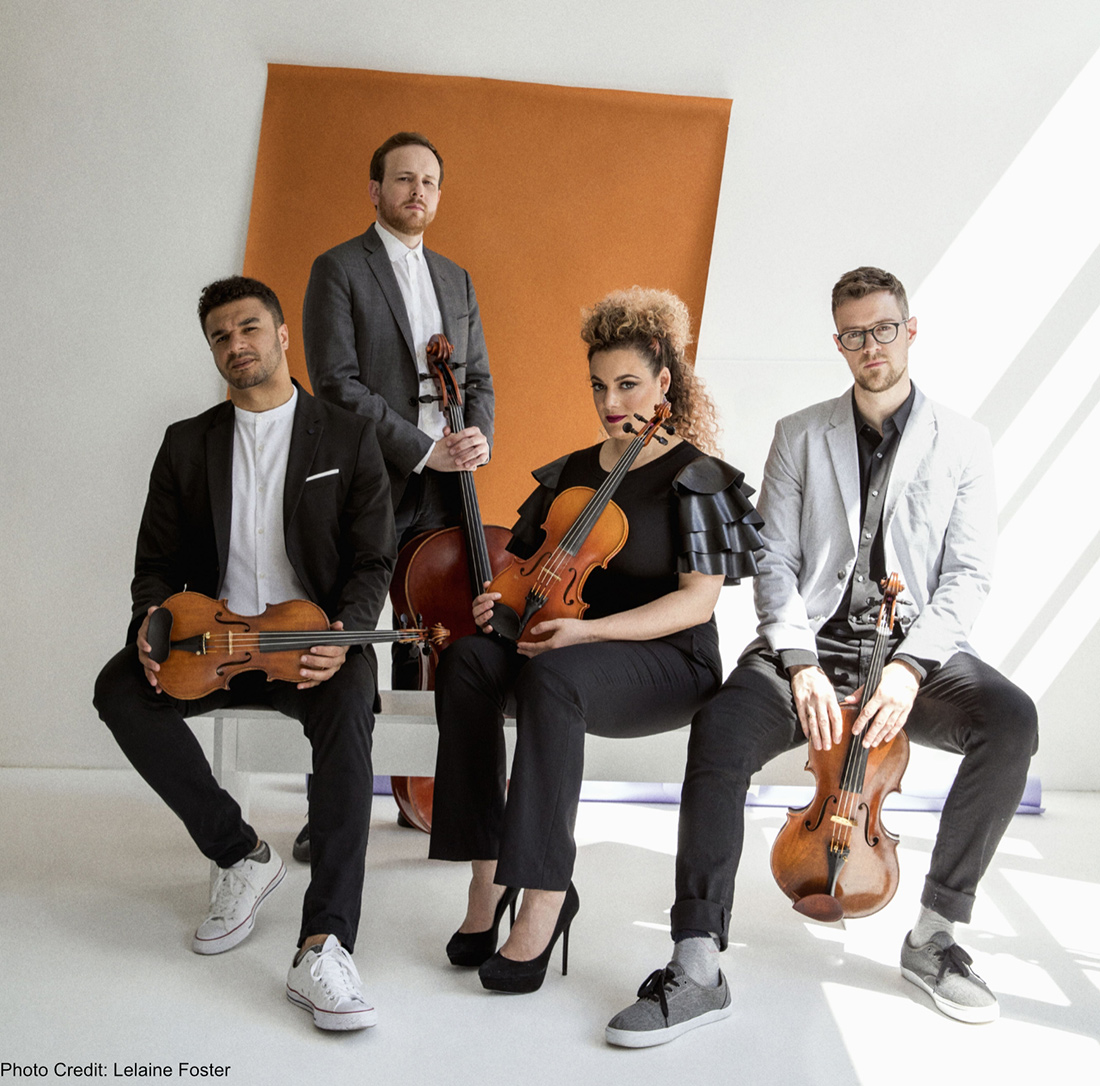Applauded by The Washington Post as “a perfect encapsulation of today’s trends in chamber music,” PUBLIQuartet’s creative, interactive programming presents contemporary works, original compositions, and improvisations expanding the role of the string quartet. In 2019 the group received their first Grammy nomination for their sophomore album, Freedom & Faith, cementing them as one of the premiere new music groups of our time. They served as artist-in-residence at top institutions including the Metropolitan Museum of Art and National Sawdust and appeared at a wide variety of venues and festivals, from Carnegie Hall and the Newport Jazz Festival to The Late Show with Stephen Colbert.
“What is American?” thoughtfully ponders this question through a musical kaleidoscope of composers and diverse genres that make up America’s rich musical history. Featuring our MIND | THE | GAP reimagination of Dvorak’s “American” Quartet, in which the composer’s original melodies meet PQ’s blues, jazz and rock-inflected improvisations, this program also includes works by Duke Ellington, Vijay Iyer, and Ornette Coleman, connecting the dots to illuminate the past, present, and future of American music.
Vijay Iyer (1971): Dig The Say (2012)
Fats Waller (1904–1943): Curtis Stewart Pavement Pounding Rose (1929 / 2019)
MIND | THE | GAP: Free Radicals (2021)
Improvisations on “Law Years” and “Street Woman” by Ornette Coleman
MIND | THE | GAP: Wild Women Don’t Get the Blues (2021)
Improvisations on the music of Alice Coltrane, Ida Cox, Betty Davis, and Tina Turner
Duke Ellington (1899–1974): Come Sunday (1942)
MIND | THE | GAP: What is American? (2016)
Improvisations on Antonin Dvorak’s “American” Quartet (Op. 96)
Program is subject to change
Notes by Joe Gusmano
PUBLIQuartet 22-23 Program
What Is American?
“What is American?” thoughtfully ponders this question through a musical
kaleidoscope of composers and diverse genres that make up America’s rich
musical history. Featuring our MIND | THE | GAP reimagination of Dvorak’s
“American” Quartet, in which the composer’s original melodies meet PQ’s
blues, jazz and rock-inflected improvisations, this program also includes works by
Duke Ellington, Vijay Iyer, and Ornette Coleman, connecting the dots to
illuminate the past, present, and future of American music.
Dig The Say (2012)…………………………………. Vijay Iyer (1971-)
Vijay Iyer is an American composer, multimedia artist, violinist, pianist, and writer. Iyer completed a B.S. in Math and Physics at Yale, an M.A. at UC Berkley. He maintained his musical interests by playing in jazz bands, and eventually focused his PhD on music cognition.
Following this degree program, Iyer became an active performer and composer of a wide variety of musical styles. Dig the Say was commissioned by the Brooklyn Ryder Quartet as part of the Bach Society Festival in 2012. Iyer chose James Brown as his creative muse and decided to write a quartet with driving rhythms and interlocking parts meant to emulate the way The Godfather of Soul’s band communicated with one another. The piece even includes some direct quotations from James Brown songs.
Pavement Pounding Rose (1929 / 2019) ……… Fats Waller (1904-1943)/Curtis Stewart
This quartet is an excerpt from the PUBLIQuartet’s project, Reflections on Beauty, which explores the life and world of Madame CJ Walker, the first black American multimillionaire. The project sought to capture the sights and sounds of Madame Walker’s life in New York City during the early 1900s. This excerpt uses musical quotations from Fats Waller’s “Honeysuckle Rose” as well as other popular rag and blues tunes from that time.
Pavement begins with a serene texture, but is still full of sharp dissonances. The jaunty rhythms of Waller’s piece are continually interrupted by sudden glissandi and flurries of notes that represent the hustle and bustle of NYC. In addition to conventional string techniques and bowings, the performers stomp, clap, and tap their instruments to produce a wide range of sounds and textures.
MIND | THE | GAP: Free Radicals (2021)
Improvisations on “Law Years” and “Street Woman” by Ornette Coleman
This quartet blends motives from Ornette Coleman’s 1971 album, Science Fiction. The piece balances structure and freedom, equalizing the roles of harmony, melody, tempo, and phrasing. Coleman referred to this balance of musical materials as the philosophy of “Harmolodics.”
The piece begins with a pizzicato line on the cello, which eventually becomes a bowed figure that receives a response from the other bowed strings. The strings bloom into a rich blend of resonant chords and melodies. This texture eventually dissipates, as each performer trades short, improvised motives. Ideas then get passed from one string instrument to the next in a conversational way. This piece is also full of spiccato bowing, where the bow appears to bounce lightly off the strings.
MIND | THE | GAP: Wild Women Don’t Get the Blues (2021)
Improvisations on the music of Alice Coltrane, Ida Cox, Betty Davis, and Tina Turner
The title of this piece comes from Ida Cox’s feminist blues anthem, “Wild Women Don’t Have the Blues.” This quartet also draws from the music of Alice Coltrane, Betty Davis, and Tina Turner, showcasing independent women who held their own. Wild Women Don’t Get the Blues demonstrates the musical connections across a variety of genres and time periods to create an entirely new piece of music.
The quartet begins with interlocking clapping rhythms as the players recite lyrics from Tina Turner’s “Black Coffee.” The cello is the first instrument to enter, playing a bass line that becomes the foundation of the rest of the piece. Once all of the other strings join in with bowed, rhythmic figures, they suddenly shift into pizzicato playing. The violinists trade improvised solos, often playing close to the bridge, or sul ponticello, which produces more inexact overtones and distortion. Throughout the piece the musicians sing, clap, and improvise.
Come Sunday (1942) ………………………… Duke Ellington (1899-1974)
Perhaps one of the most famous big band composers, Duke Ellington ran his jazz orchestra from 1923 until the end of his life in 1974. He gained national recognition through his regular appearances at the Cotton Club in Harlem. Ellington would lead his ensemble at the piano, but he also spent much of his life composing and arranging with his friend and creative partner Billy Strayhorn. Though he is seen as a pivotal figure in jazz history, Ellington himself was resistant to being tied down to one particular genre. Instead, he described his music in more general terms, calling it American Music.
“Come Sunday” was originally written as the first movement of a suite, Black, Brown, and Beige, which Ellington composed in 1942. It became a showcase piece for his alto saxophone player, Johnny Hodges. Ellington eventually revised it in 1958 and added lyrics for the singer Mahalia Jackson, which then made the piece much more popular.
MIND | THE | GAP: What is American? (2016)
Improvisations on Antonin Dvorak’s “American” Quartet (Op. 96)
This quartet takes musical ideas from Dvorak’s String Quartet No. 12, sometimes referred to as the “American” Quartet. The work maintains its original four-movement structure, but the musical ideas are twisted and infused with more contemporary string techniques. Dvorak’s quartet was meant to incorporate a variety of American folk music idioms. In many ways, the PUBLIQuartet continues this work, but catches Dvorak up on the litany of American folk and popular music styles from the past century.
Each movement maintains certain elements of the original melodic and harmonic ideas set down by Dvorak. The players improvise by clapping, tapping on their instruments, singing, and distorting the sounds of their instruments to the point where divisions between noise and pitch become blended and obscured.
PUBLIQuartet
Curtis Stewart & Jannina Norpoth, violins; Nick Revel, viola; Hamilton Berry, cello
Applauded by The Washington Post as “a perfect encapsulation of today’s trends in chamber music,” PUBLIQuartet’s creative, interactive programming presents contemporary works, original compositions, and improvisations expanding the role of the string quartet. In 2019 the group received their first Grammy nomination for their sophomore album, Freedom & Faith, cementing them as one of the premiere new music groups of our time.PUBLIQuartet’s commitment to support emerging composers inspired their innovative program, PUBLIQ Access, which promotes emerging composers and presents a wide variety of under-represented music for string quartet–from classical, jazz and electronic, to non-notated, world and improvised music. At least one of these works is showcased on virtually every program the Quartet performs, and they have regular showcase performances in New York to present the newest pieces in this growing catalogue.PUBLIQuartet is sought after for its creative and energetic educational workshops. The quartet’s mission to enrich and inspire students of diverse backgrounds has led PQ to hold residencies with American Composers Orchestra and Deer Valley Music Festival’s “Emerging Quartets and Composers” program, among others.Founded in 2010, PUBLIQuartet has been presented by The American Composers Orchestra, Virginia Arts Festival, Great Lakes Chamber Music Festival and The Chautauqua Institution. Their 20-21 season highlights include performances at Onstage Ogden, Underground Classical, Cleveland Uncommon Sound Project and a virtual performance with the Chautauqua Institution. PQ has collaborated with members of the International Contemporary Ensemble (ICE), JACK Quartet, jazz tuba legend Bob Stewart, and innovative jazz clarinetist/composer Don Byron. Mentors include members of the Muir, Juilliard, Orion, Mendelssohn, Tokyo, American, and Brentano String Quartets and composers Joan Tower and Butch Morris. They have participated in residencies at the Juilliard String Quartet Institute, Robert Mann String Quartet Institute, the Shouse Institute (GLMF), and the Banff Centre. PUBLIQuartet is currently based in New York City.
PUBLIQuartet is represented by Concert Artists Guild, 135 East 57th St 7th Fl New York.




